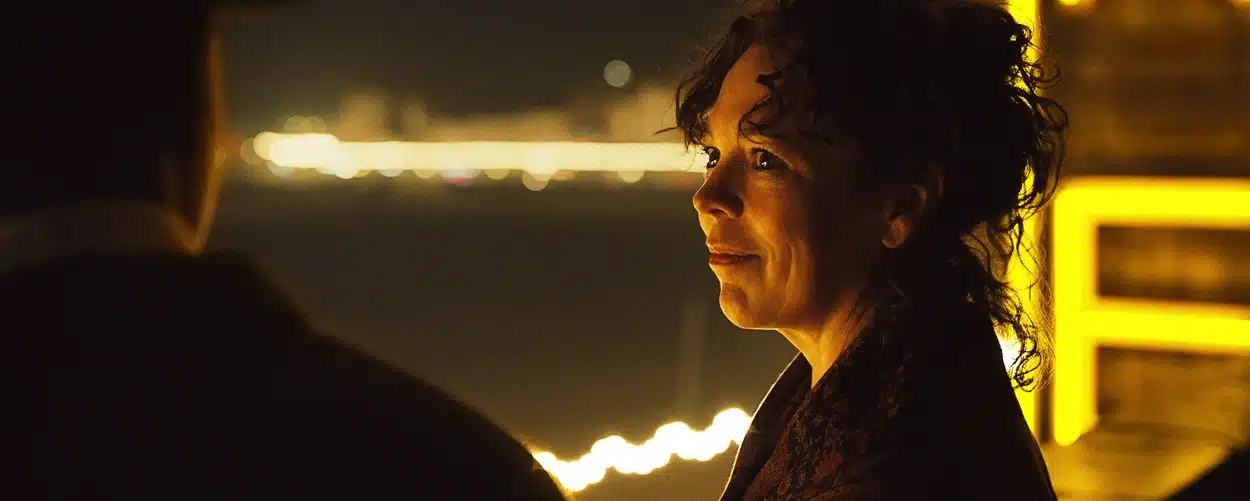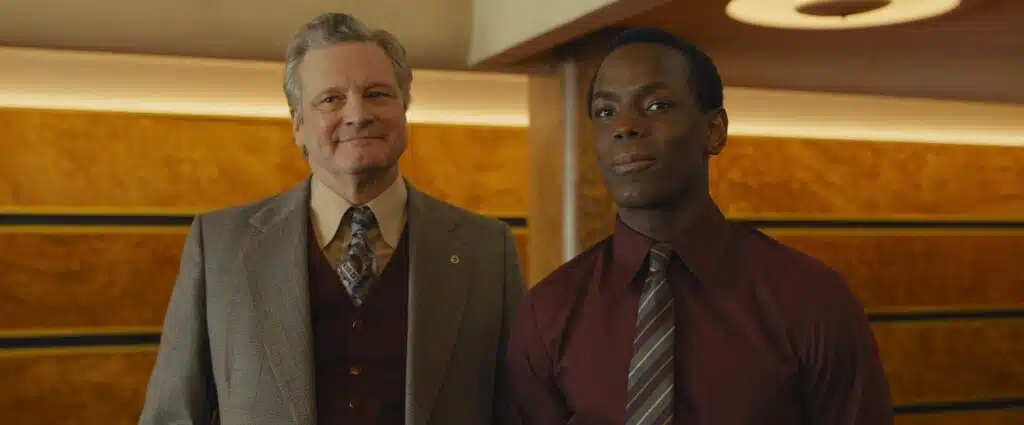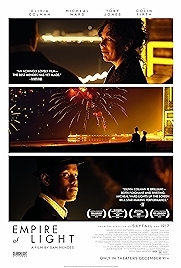Margate on the south coast of England is one of many British seaside towns that’s seen better days. So has its cinema, Wonderland, here renamed by Sam Mendes and his team as the Empire, for a story set in 1980 about people who’ve seen better days, a country too, perhaps. Britain once had an empire of its own, of course.
Metaphor and symbolism hang heavy in Empire of Light and affect every aspect of it. In the opening sequences cinematographer Roger Deakins’s camera mooches balefully about the interior of this palace of plush. Trent Reznor and Atticus Ross’s score weeps. This place isn’t in good shape. Bits are roped off, a whole floor abandoned.
Then we meet the staff. Hilary (Oliva Colman), bipolar and on her meds, is duty manager. Donald (Colin Firth) the manager is a seedy man who expects Hilary to fellate him when she’s not refilling the popcorn. Norman (Toby Jones) the projectionist has a condemned man’s demeanour. Neil (Tom Brooke) is one of those jokers who’s probably going to say “you’ve gotta laugh or you’ll cry” at some point. Janine (Hannah Onslow) is a seaside Siouxsie Sioux with backcombed hair and an attitude.
They do their job. And in between screenings even have what might be called a good time, joking, sharing moments, swapping stories about the stuff they’ve found while sweeping up the popcorn at the end of a day’s screenings.
And then, into this backwater arrives Stephen (Micheal Ward), a black British youth. Smart, educated Stephen is slightly out of place here. Unlike the rest of them he has prospects. He wants to go to university to study architecture but has failed to get in.
We don’t know why but suspect racism might have played a part as it seems to in much of Stephen’s life – menaced by skinheads on the street, harangued by an old white customer when Stephen asks him to bring his takeaway into the cinema.
Mendes spins these characters through several scenarios, along the way losing sight of most of them. As an asymmetric romance develops between young Stephen and middle-aged Hilary, Janine, projectionist Norman, manager Donald and joker Neil all fall largely by the wayside. What’s left is a story about Hilary. Or Stephen. Or Stephen and Hilary, Mendes never seems that sure, while the metaphor of the cinema as the state of the nation also demands attention.
At one point Stephen and Hilary go up into the derelict top floor of the building, where they find a pigeon with a broken wing and tend to its injury. At another projectionist Norman explains that movies projected on celluloid are 24 burst of light a second “with darkness in between.”
Mendes, who wrote as well as directed, is having an attack of the intellectual swots here, injecting themes, ideas, allusion and metaphor like a student trying to impress an examiner. TS Eliot’s The Waste Land is mentioned – “April is the cruellest” month etc. At another point Hilary gives Stephen a book of poetry by arch miserabilist Philip Larkin.
Mendes, who wrote as well as directed, is having an attack of the intellectual vapours here, injecting themes, ideas, allusion and metaphor like a student trying to impress an examiner. TS Eliot’s The Waste Land is mentioned – “April is the cruellest” month etc. At another point Hilary gives Stephen a book of poetry by arch miserabilist Philip Larkin.
Colman is good at this stuff. She can do snot-gobbling abject misery almost like no one else. And she can light up like a Christmas tree when required. She gets opportunities to do both – a bipolar character offers that – but it’s mostly at the miserable end of the spectrum that this film dwells.
Micheal Ward is good enough by Mendes doesn’t really know what Stephen is for. Is he just a catalyst, or a character in his own right? Is this film about him or Hilary? Or cinema as escape and uplift? Or the importance of networks of friendship for good mental health? Or the UK in the 1980s? Or the UK in 2020s even – leaving the European Union was, for many who voted that way, an opportunity to rekindle the past, for Empire 2.0, as some people called it.
And though it’s never mentioned, the Empire Windrush, the ship that totemically brought so many immigrants from the Caribbean from the 1950s onwards – and might have brought Stephen’s parents too – lurks like a phantom.
So many Empires in the Empire. There are flashes of optimism – Stephen’s future, the existence of the ska-driven Two Tone music scene, which fused white and black youth in the late 70s and early 80s. But it’s a dour movie trying to do a lot hastily rather than a little well. Margate won’t thank Mendes for this portrait of it, though it must be used to these “on its arse” portraits by now, and there is some affection here too, for rain-lashed promenades and their vistas of faded glory.
Empire of Light – Watch it/buy it at Amazon
I am an Amazon affiliate
© Steve Morrissey 2023


